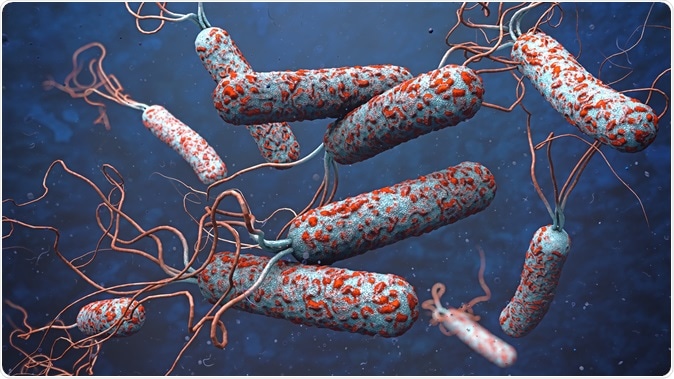The Zimbabwe government has declared emergency in the capital city of Harare after 20 people died of cholera. According to the health minister Obediah Moyo, the state is grim with around 2,000 cases of cholera being reported across the country and the disease spreading fast.
Moyo said on the 11th of September (Tuesday) in a statement, “We are declaring an emergency for Harare. This will enable us to contain the cholera, typhoid and whatever is going on, to get rid of the problem as quickly as possible.” He was visiting the regions of the city that have been worst affected with the disease. According to Moyo broken sewers and poor disposal of the wastes have lead to contamination of the drinking water sources in Harare. This has led to the outbreak of the disease in the city. There have been burst sewers in highly populated regions of suburbs of Budiriro and Glenview. From there the disease has spread to four other provinces.

3d illustration of cholera pathogens. Image Credit: Christoph Burgstedt / Shutterstock
The government has closed the schools temporarily and also banned the sale of meat and fish in the affected regions to combat the outbreak. The government and the police are enforcing laws to stop urinating and defecating in public and is sending out text messages, verbal communication via audio and audio visual media to the general public to prevent spread of cholera and typhoid. People are being made aware of the signs and symptoms to look for and when they are to seek medical help. They are given tips on how to prevent cholera and typhoid infections.
Zimbabwe cholera outbreak update
The UNICEF at present is assisting the Zimbabwe government with resources to combat the outbreak. UNICEF Representative in Zimbabwe Mohamed Ayoya said in a statement, “We have also alerted our regional offices and headquarters because we know this is a very serious issue, which will need quite huge investments to contain the outbreak. We are working very hard to help the government.” Calvin Fambirai, head of Zimbabwe Doctors for Human Rights has urged the government to step up the condition of the waste disposal systems especially in the regions that are thickly populated to prevent the water bourne disease now and in the future. Fambirai said in a statement, “The conditions that necessitate the spread of cholera and typhoid in Zimbabwe have not changed since the 2008 outbreak. They have worsened because there is no political will to tackle it.” WHO spokesperson Christian Lindmeier said in a statement to Reuters, “Partners are already there and are establishing a cholera treatment centre. WHO is preparing material for patients care as well and is mobilising cholera experts.”
Cholera is a bacterial disease caused by fecal bacteria Vibrio cholerae. It is contracted by consuming food and water that has been contaminated with the bacteria from infected persons. Poor sanitation and hygiene is responsible for its spread. The disease is typically characterized by acute diarrheal illness which may lead to severe dehydration and may even be fatal. In 2008 over 4,000 people died of cholera in Zimbabwe says the World Health Organization. The disease is more common in developing nations and those that are densely populated and economically backward. Poor water treatment systems and poor sanitation and hygiene practices are conducive to spread of cholera among these populations.
Dr Matshidiso Moeti, the WHO’s regional director for Africa called cholera a disease of “inequity”. He said, “It’s an ancient disease, which has been eliminated in many parts of the world. Every death from cholera is preventable. We have the knowhow and today countries have shown that they have the will to do whatever it takes to end cholera outbreaks by 2030.”
The President of Zimbabwe in a tweet said, “My thoughts & prayers are with those suffering from the cholera outbreak, and the loved ones of those we have lost. In order to contain the outbreak & mobilize resources we have declared a state of emergency in Harare, and are working closely with our international partners. I urge all residents of affected areas to exercise extra care with their hygiene & follow the instructions of the authorities as we seek to contain & overcome this outbreak. We are working tirelessly to control the situation and hope to communicate progress in due course.”